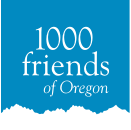With Greg Holmes
1000 Friends' Working Lands Program Director Greg Holmes has been appointed to the Oregon Global Warming Commission's (OGWC) Natural and Working Lands Advisory Committee. The Advisory Committee will advise the OGWC as it figures out the role that Oregon's farm, ranch, and forest lands will play in the state's response to climate change. We asked Greg some questions about what the work of this committee means for 1000 Friends, and for Oregon.
Q: Why was the Oregon Global Warming Commission Natural and Working Lands Advisory Committee formed?
A: In 2020, Governor Brown issued Executive Order EO 20-04, which included direction to the OGWC to create a proposal for how Oregon's working lands (farm, ranch, and forest lands) could help the state meet climate goals previously established by the legislature. After extensive public input--which 1000 Friends participated in--the OGWC submitted its Natural and Working Lands Proposal to the Governor. The Advisory Committee was established this October to provide the OGWC with "current knowledge, critical thinking, analysis, and perspectives that inform the implementation" of the Proposal.
Q: What is in the proposal?
A: The Proposal provides a target for the amount of carbon that could realistically and cost-effectively be sequestered by Oregon's working lands if certain recommended programs were put in place. It describes incentive-based, voluntary programs that would help meet those goals, and recommends specific policies and funding for those programs.
Q: What role do you and 1000 Friends of Oregon play in the work of the advisory committee?
A: The proposal recognizes that the voluntary programs that are described cannot succeed without farm, forest, or ranch lands to implement them on. For this reason, it also includes a recommendation to enhance and strengthen the land use planning program and the protections it provides for working lands. That, of course, is a major part of 1000 Friends' mission. In fact, we already have a roadmap for how to strengthen protections for farm and ranch land in our Death by 1000 Cuts report from 2020. Implementing the recommendations in that report, as well as similar changes for forest land protections, will go a long way to meeting the climate goals in the Proposal.
Our role will be to keep some focus on protections for the land base, and to make sure that the programs proposed by experts in other fields will be helpful for Oregon's farmers, ranchers, and foresters.
Q: Who else is on the advisory committee, and how were you all selected?
A: A call went out this past summer for people to apply to be a part of the committee. In addition to experts on climate issues and in farming, ranching, and forestry, the OGWC specifically wanted representation for natural areas (mostly tidal areas and wetlands), urban open-space, communities that bear the most impact from climate changes, and tribal governments. The final list of the 26 Oregonians that were appointed to the advisory committee is here.
Q: Why is the work of this committee important for Oregon?
A: The managers of Oregon's natural and working lands are already seeing impacts from climate change--whether they be drought, changes in growing seasons, extreme temperatures, flooding and erosion, or wildfire. Whether helping with water retention and erosion control, soils health and productivity gains, or technical assistance and workforce training, programs like those in the Proposal will help Oregon be more resilient in the face of these changes. And as other parts of the country become too hot and dry for agriculture or forestry, having a reliable base of land for these practices will help keep Oregon's economy diverse and strong.
